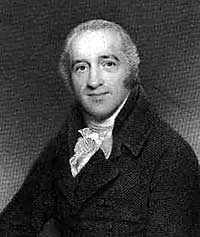teacher, promotor of missionary work
1759-1836


Charles Simeon (September 24, 1759 – November 13, 1836), was an English evangelical clergyman.
He was born at Reading, Berkshire and educated at Eton College and King's College, Cambridge. In 1782 he became fellow of King's College, and took orders, receiving the living of Holy Trinity Church, Cambridge, in the following year. He was at first so unpopular that services were frequently interrupted, and he was often insulted in the streets. Having overcome public prejudice, he subsequently gained a remarkable and lasting influence among the undergraduates of the university.
Two hundred years ago, students at the English Universities were required to attend church regularly, and to receive the Holy Communion at least once a year. This latter requirement often had bad effects, in that it encouraged hypocrisy and an irreverent reception of the sacrament. Occasionally, however, it had a very good effect, as with the Cambridge student Charles Simeon. He wrote:
"On 29 January 1779 I came to college. On 2 February I understood that at division of term I must attend the Lord's Supper. The Provost absolutely required it. Conscience told me that, if I must go, I must repent and turn to God."
By this experience his life was transformed. Upon finishing his college work he was ordained, and shortly appointed chaplain of Holy Trinity, Cambridge, where he remained for 55 years, until shortly before his death on 12 November 1836. His ministry helped to transform the lives of many undergraduates, of whom we may mention two in particular. Henry Martyn (19 October), inspired by Simeon, abandoned his intention of going into law and instead devoted his life and his considerable talents to preaching the Gospel in India and Persia. William Wilberforce (30 July), also led in part by Simeon's ministry of teaching and example, devoted his life to the abolition of slavery throughout the British Empire. Simeon's enthusiasm and zeal brought him much ridicule and abuse, which he bore uncomplainingly. Though he himself remained in one place, his influence extended through the Anglican world.
He became a leader among evangelical churchmen, was one of the
founders of the Church Missionary Society in 1799, the London Society for
Promoting Christianity Amongst the Jews (now known as the Church's Ministry
Among Jewish People or CMJ) in 1809, and acted as adviser to the British East
India Company in the choice of chaplains for India.
In 1792 he read An Essay on the Composition of a Sermon by the French Reformed
minister Jean Claude. Simeon found that their principles were identical and used
the essay as the basis for his lectures on sermon composition. Claude’s essay
also inspired Simeon to make clear his own theological position, the result
being Horae Homileticae, his chief work.
He published hundreds of sermons and outlines of sermons (called "sermon
skeletons"), still in print, that to some were an invitation to clerical
plagiarism. His chief work is a commentary on the whole Bible, entitled Horae
homileticae (London). The Simeon Trust was established by him for the purpose of
acquiring church patronage to perpetuate evangelical clergy in Church of England
parishes. It continues to operate to this day.
Charles Simeon is often hailed as something of an ancestor of the evangelical
movement in the Church of England.
According to the historian Thomas Macaulay, Simeon's "authority and influence…
extended from Cambridge to the most remote corners of England, …his real sway in
the Church was far greater than that of any primate." He is remembered in the
Episcopal Church of the United States with a Lesser Feast and in the Anglican
Church of Canada with a Commemoration on 12 November. In the Church of England
he is remembered with a Lesser Festival on 13 November. His memorial by the
monumental mason Hopper in Holy Trinity Church (Cambridge), was described by
architectural critic Nikolaus Pevsner as an "epitaph in Gothic forms."
Prayer (traditional language)
O loving God, who orderest all things by thine unerring wisdom and unbounded love: Grant us in all things to see thy hand; that, following the example and teaching of thy servant Charles Simeon, we may walk with Christ in all simplicity, and serve thee with a quiet and contented mind; through Jesus Christ our Lord, who liveth and reigneth with thee and the Holy Spirit, one God, now and for ever.Prayer (contemporary language)
O loving God, who order all things by your unerring wisdom and unbounded love: Grant us in all things to see your hand; that, following the example and teaching of your servant Charles Simeon, we may walk with Christ in all simplicity, and serve you with a quiet and contented mind; through Jesus Christ our Lord, who lives and reigns with you and the Holy Spirit, one God, now and for ever.Psalm 145:8-13 or 96:1-7